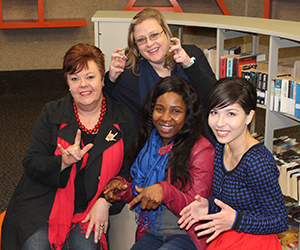Latest News Archive
Please select Category, Year, and then Month to display items
01 January 2020
|
Story Eugene Seegers
|
Photo Kaleidoscope Studios | Sonia Small
 Dr Maria Madiope took over the reins of the UFS South Campus at the beginning of January 2020.
Dr Maria Madiope took over the reins of the UFS South Campus at the beginning of January 2020.
The Council of the University of the Free State (UFS) approved the appointment of Dr Maria ‘Marinkie’ Madiope as Principal of the South Campus for Open Distance Learning (ODL) during a meeting held on 20 September 2019. Dr Madiope took over the reins of the UFS South Campus at the beginning of January 2020.
Educator at heart
Educating and empowering others are key aspects of Dr Madiope's life. She has served as the Director for University Teaching and Learning at Unisa since 2015 and takes her role incredibly seriously, achieving a transformative curriculum at the colleges under her care since her appointment.
Dr Madiope holds a PhD in Education from Unisa, with a specialisation in Didactics; her next two degrees where completed at the then RAU, which is today known as the University of Johannesburg: a BEd in 1999, followed by an MEd in 2001, both specialising in Computer-based Instruction. She previously obtained her BA Ed in 1985 and a BEd in 1988 from the University of the North. Her initial training as a teacher was from the Hebron College of Education from 1980-81.
Dr Madiope is also the editor of the only journal in ODL, Progressio, since 2016. Her expertise in E-learning is another of her strong points. Together with her team, Dr Madiope designed and developed the first online course in Curriculum Transformation, which is being piloted at Unisa. Her work has been rewarded with awards such as the Unisa Gender Activism: Advocacy and Promotion of Women’s Rights 2013, Unisa Woman of the Year 2013, and Unisa Best Performer 2013.
Dr Madiope brings with her a wealth of experience to UFS and her vision is to increase access to a wider base of learners with potentially having more African learners enrolled. The first point of call would be to have more learners coming from Lesotho and then the rest of the SADEC region, having the UFS become a leading distance-learning university. One of the key projects that Dr Madiope wishes to tackle is early childhood development. “I believe in educating educators to ensure that they are best equipped to provide the latest and relevant Early childhood and development practices that are on par with the rest of the world,” she says.
Community leader
In addition to being an experienced educator and administrator, Dr Madiope is instrumental in community projects that lie close to her heart. Whether it is large-scale advocacy for women’s rights or her personal involvement in the supply of sanitary towels for schoolgirls as part of a programme to empower the girl child through exposing them to options, it is humbling to watch her compassion in action.
She further intends to strengthen the relationship of the university with TVET Colleges and community colleges by providing mutually beneficial programmes that will up-skill those colleagues by giving them an opportunity to work with experienced UFS staff members. She says, “Reaching out to colleagues in TVET and Community colleges will offer them the opportunity to advance their lecturing and learning programmes, which will only lead to benefiting their learners and South Africa as a whole.”
Largest group on African continent introduced to Sign Language
2016-07-05
 The introduction of basic Sign Language
The introduction of basic Sign Language
as part of the UFS101 course was a great
success. From left are Susan Lombaard,
Annemarie le Roux, Tshisikhawe Dzivhani
(all from the Department of South African
Sign Language), and Lauren Oosthuizen
(UFS101). Photo: Leonie Bolleurs
As a result of a new initiative at the University of the Free State (UFS), the largest group of students on the African continent took part in a first-year seminar which included Sign Language.
A total of 5400 students on the Bloemfontein Campus and 1000 on Qwaqwa Campus were taught basic Sign Language by Susan Lombaard, Acting Head of the Department of South African Sign Language, and her team members, Tshisikhawe Dzivhani, Annemarie le Roux, and Nicolene de Klerk.
It forms part of the UFS101 module presented to all first-year students. The initiative, begun in the first semester of 2016, will form part of UFS101 in future and was met with an overwhelmingly positive response.
Three segments of course
Sign Language was taught in three segments and positioned as large-class learning experiences in the Callie Human Centre (Bloemfontein Campus) and the Nelson Mandela Hall (Qwaqwa Campus). Students were taught about deaf culture, Sign Language theory, as well as how to sign their names, exchange pleasantries, and have a basic conversation.
A valuable skill to have
“It (the Sign Language experience) was very interesting and helpful,” said one of the students. “It is important to have the ability to communicate with all sorts of people, and to be able to help them in a crisis”. According to another, it sparked an interest in Sign Language. “It is a skill I will continue to use and try to learn more from it,” said a third.
Lombaard – in collaboration with the UFS101 team – will be presenting a paper related to this achievement at the DeafNet Africa Conference in Johannesburg, from 26 to 30 September 2016.